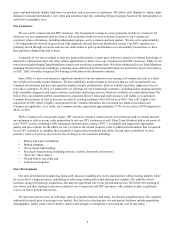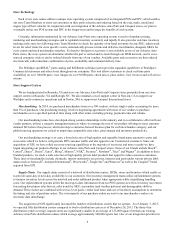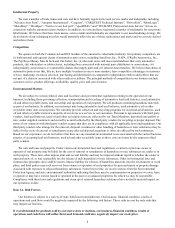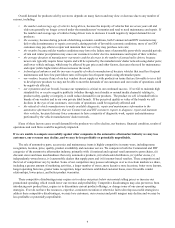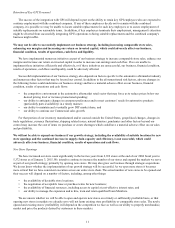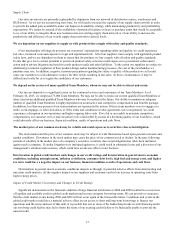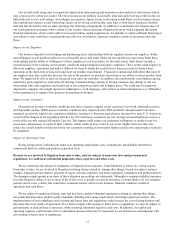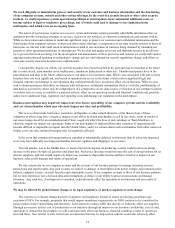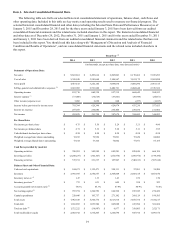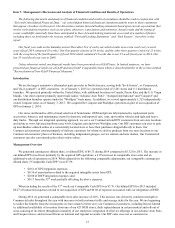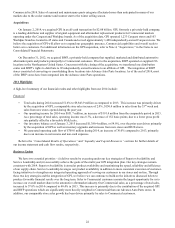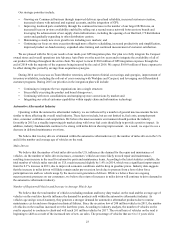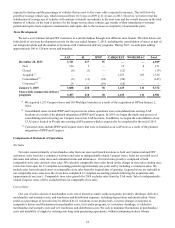Advance Auto Parts 2014 Annual Report Download - page 21
Download and view the complete annual report
Please find page 21 of the 2014 Advance Auto Parts annual report below. You can navigate through the pages in the report by either clicking on the pages listed below, or by using the keyword search tool below to find specific information within the annual report.14
We work diligently to maintain the privacy and security of our customer and business information and the functioning
of our computer systems, website and other on-line offerings. In the event of a security breach or other cyber security
incident, we could experience certain operational problems or interruptions, incur substantial additional costs, or
become subject to legal or regulatory proceedings, any of which could lead to damage to our reputation in the
marketplace and added costs on an ongoing basis.
The nature of our business requires us to receive, retain and transmit certain personally identifiable information that our
customers provide to purchase products or services, register on our websites, or otherwise communicate and interact with us.
While we have taken and continue to undertake significant steps to protect our customer and confidential information and the
functioning of our computer systems, website and other online offerings, a compromise of our data security systems or those of
businesses we interact with could result in information related to our customers or business being obtained by unauthorized
persons or other operational problems or interruptions. We develop and update processes and maintain systems in an effort to
try to prevent this from occurring, but the development and maintenance of these processes and systems are costly and requires
ongoing monitoring and updating as technologies change, privacy and information security regulations change, and efforts to
overcome security measures become more sophisticated.
Consequently, despite our efforts, our security measures have been breached in the past and may be breached in the future
due to cyber attack, team member error, malfeasance, fraudulent inducement or other acts. Unauthorized parties have in the
past obtained, and may in the future, obtain access to our data or our customers’ data. While costs associated with past security
breaches have not been significant, any breach or unauthorized access in the future could result in significant legal and
financial exposure and damage to our reputation that could potentially have an adverse effect on our business. While we also
seek to obtain assurances that others we interact with will protect confidential information, there is a risk the confidentiality of
data held or accessed by others may be compromised. If a compromise of our data security or function of our computer systems
or website were to occur, it could have a material adverse effect on our operating results and financial condition and, possibly,
subject us to additional legal, regulatory and operating costs and damage our reputation in the marketplace.
Business interruptions may negatively impact our store hours, operability of our computer systems and the availability
and cost of merchandise which may adversely impact our sales and profitability.
War or acts of terrorism, hurricanes, tornadoes, earthquakes or other natural disasters, or the threat of any of these
calamities or others, may have a negative impact on our ability to obtain merchandise to sell in our stores, result in certain of
our stores being closed for an extended period of time, negatively affect the lives of our customers or Team Members, or
otherwise negatively impact our operations. Some of our merchandise is imported from other countries. If imported goods
become difficult or impossible to import into the United States, and if we cannot obtain such merchandise from other sources at
similar costs, our sales and profit margins may be negatively affected.
In the event that commercial transportation is curtailed or substantially delayed, our business may be adversely impacted,
as we may have difficulty receiving merchandise from our suppliers and shipping it to our stores.
Terrorist attacks, war in the Middle East, or insurrection involving any oil producing country could result in an abrupt
increase in the price of crude oil, gasoline and diesel fuel. Such price increases would increase the cost of doing business for us
and our suppliers, and also would negatively impact our customers’ disposable income and have an adverse impact on our
business, sales, profit margins and results of operations.
We rely extensively on our computer systems and the systems of our business partners to manage inventory, process
transactions and report results. Any such systems are subject to damage or interruption from power outages, telecommunication
failures, computer viruses, security breaches and catastrophic events. If our computer systems or those of our business partners
fail we may experience loss of critical data and interruptions or delays in our ability to process transactions and manage
inventory. Any such loss, if widespread or extended, could adversely affect the operation of our business and our results of
operations.
We may be affected by global climate change or by legal, regulatory, or market responses to such change.
The concern over climate change has led to legislative and regulatory initiatives aimed at reducing greenhouse gas
emissions (GHG). For example, proposals that would impose mandatory requirements on GHG continue to be considered by
policy makers in the United States and elsewhere. Laws enacted to reduce GHG that directly or indirectly affect our suppliers
(through an increase in their cost of production) or our business (through an impact on our inventory availability, cost of sales,
operations or demand for the products we sell) could adversely affect our business, financial condition, results of operations
and cash flows. New federal or state restrictions on emissions that may be imposed on vehicles could also adversely affect


